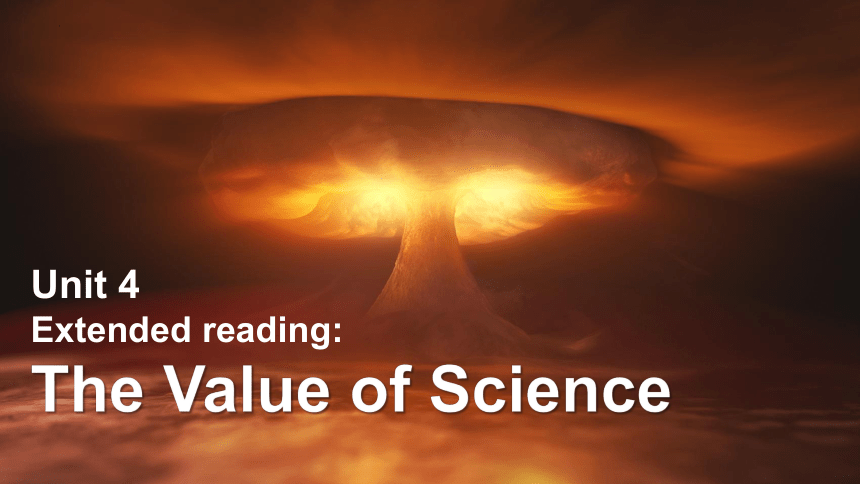(
课件网) Unit 4 Extended reading: The Value of Science Clue 1:joined the Manhattan Project at the age of 24 to develop atomic bomb(曼哈顿计划-研制原子弹) Lead in: Guess who he is(3 clues 三条线索) Mushroom cloud(蘑菇云) atomic explosion Clue 3:won the Nobel Prize in Physics in 1965 Clue 2:came up with the concept of nano(纳米概念) Richard Feynman (1918-1988) Understanding Finish the following mind map after reading the lecture transcript Part 2 (paras. 3-6): Three values of science Part 3 (para. 7): Duty of scientists (3)_____. Scientific knowledge enables... (4)_____. Science can provide... (5)_____. Scientists have... (6)_____ (7)_____ (8)_____ to declare... to teach... to demand... Part 1 (paras. 1 and 2): Introducing the topic After he worked on the atomic bomb during the war he realized that the result of science(2)_____. represented the... When Richard Feynman was younger, (1)_____ he thought... Understanding Finish the following mind map after reading the lecture transcript Part 1 (paras. 1 and 2): Introducing the topic When Richard Feynman was younger, (1)_____ _____. After he worked on the atomic bomb during the war he realized that the result of science(2)_____ _____. he thought science would make good things for everybody represented the destruction of people and it put our future at risk Understanding Finish the following mind map after reading the lecture transcript Part 2 (paras. 3-6): Three values of science (3)_____. Part 3 (para. 7): Duty of scientists (4)_____. (5)_____. (6)_____ (7)_____ (8)_____ Scientific knowledge enables us to do and make all kinds of things Science can provide us with intellectual enjoyment Scientists have the freedom to doubt to declare the value of this freedom to teach how doubt is not to be feared but to be welcomed and discussed to demand this freedom as our duty to all coming generations Appreciation (Para. 1 and 2) In these two paragraphs, Feynman used some expressions with negative meaning to point out that there may be some “evil involved in science”. Can you find them out Para. 1 Para. 2 Appreciation (Para. 1 and 2) Feynman said, “I thought long and hard about this question.” What do you think about this This sentence reflects his mixed feelings about science: on the one hand, he loved science and had devoted himself to it; on the other hand, he saw some terrible results brought by his work on the atomic bomb—the destruction of people and threat to our future. He perhaps could not accept the fact that what he loved and was devoted to was evil. This mixture of complicated feelings caused Feynman to stop and think about science and what it meant to him and to the world. Appreciation (Para. 3) In this paragraph, the pronoun “it” is used 5 times. What does “it” refer to in each case Para. 3 making good things scientific knowledge Appreciation (Para. 4) The keyword of this paragraph is “enjoyment”. Can you find the expressio ... ...

